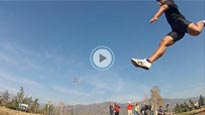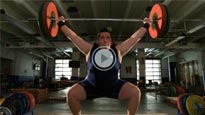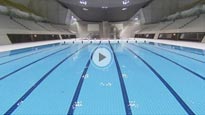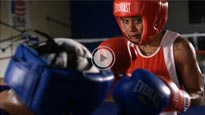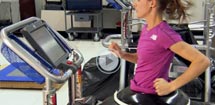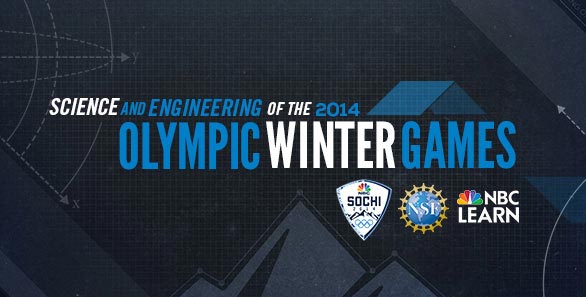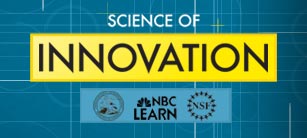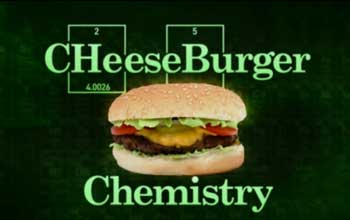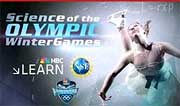
Special Video Report:
Science Behind the Summer Olympics
Courtesy: National Science Foundation, NBC Sports and NBC Learn
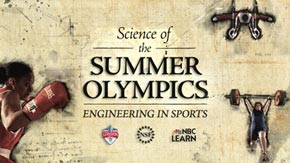
NBC Learn and NBC Sports, in partnership with the National Science Foundation, explore the engineering and technology helping athletes maximize their performance at the 2012 London Games.
For more "Science of the Summer Olympics" stories, go to www.nbclearn.com/summerolympics.
Select a video by clicking on a topic below
Measuring a Champion
Timing is everything, especially at the 2012 Summer Olympics where even a millisecond could mean the difference between victory and defeat. Linda Milor, an electrical engineer at Georgia Institute of Technology, explains why Olympic timekeeping technology must be able to measure an athlete's performance with both accuracy and precision. ?Science of the Summer Olympics? is a 10-part video series produced in partnership with the National Science Foundation.
Maximizing the Long Jump of Bryan Clay
The long jump is one of the most technically challenging events in the decathlon, a track and field competition consisting of 10 events held over two days. In order to maximize his performance, 2008 Olympic gold medalist Bryan Clay teamed up with engineers from BMW to improve measurement of the horizontal and vertical velocities of his long jumps. "Science of the Summer Olympics" is a 10-part video series produced in partnership with the National Science Foundation.
Sarah Robles and the Mechanics of Weightlifting
U.S. weightlifter Sarah Robles will rely on an athletic mix of strength, speed and timing to help create explosive power when she competes at the 2012 Summer Olympics. Robotics engineer Brian Zenowich compares Robles' movements to those made by the WAM Arm, one of the world's most advanced robotic arms. "Science of the Summer Olympics" is a 10-part video series produced in partnership with the National Science Foundation.
The Biomechanics of Usain Bolt
Jamaican sprinter Usain Bolt holds the World and Olympic records for the fastest time in the 100-meter sprint. Bolt's stride, strength, and muscle coordination make him not just a biomechanical marvel, but also a gold medal favorite at the 2012 Summer Olympics. "Science of the Summer Olympics" is a 10-part video series produced in partnership with the National Science Foundation.
Designing a Fast Pool
Along with hosting the top swimmers from around the world, the London Aquatics Center at the 2012 Summer Olympics will feature one of the most technologically advanced pools ever built. Through advances in pool design, engineers are helping swimmers reach their maximum speed with technology designed to minimize waves. "Science of the Summer Olympics" is a 10-part video series produced in partnership with the National Science Foundation.
Engineering for Mobility
At the 2012 Summer Paralympics, elite athletes with disabilities will rely on strength, speed and skill as they go for the gold in 21 different sporting events. Rory Cooper, a biomechanical engineer at the University of Pittsburgh, demonstrates how engineering can help wheelchair athletes maximize their performance in such diverse sports as wheelchair rugby, basketball and racing. "Science of the Summer Olympics" is a 10-part video series produced in partnership with the National Science Foundation.
Designing Safety Helmets
For many athletes at the 2012 Summer Olympics, safety helmets will be an essential part of their athletic gear. Nikhil Gupta, a mechanical engineer at New York University's Polytechnic Institute, explains how safety helmets are designed, constructed and tested. ?Science of the Summer Olympics? is a 10-part video series produced in partnership with the National Science Foundation.
Science of the Summer Olympics - The Impact of Jenny Simpson
Many runners suffer injuries to their joints due to the repeated impact of their feet hitting the ground. U.S. runner Jenny Simpson relies on new treadmill technology to help rehabilitate from a stress fracture as she trains for the 2012 Summer Olympics. "Science of the Summer Olympics" is a 10-part video series produced in partnership with the National Science Foundation.
Science of the Summer Olympics - Missy Franklin and Fluid Dynamics
U.S. swimmer Missy Franklin is one of the top medal contenders at the 2012 Summer Olympics. Just as engineers design planes and boats to be more aerodynamic, Franklin will need to master the basic principles of fluid dynamics in order to be the fastest swimmer in the pool.
Distributed by NIEonline.com with permission
More NIE
Special Reports
►2014 Winter Olympics
►Fighting With Food
►Sustainability: Water
►Science of Golf
►Science of Innovation
►Writers Speak to Kids
►Science behind the News
►Science of Hockey
►Black History Month
►Changing Planet
►Cheeseburger Chemistry
►Chemistry Now
►Science of the Olympics
►Science of Football
►CyberBullying
About NBC Learn
NBC Learn is the educational arm of NBC News dedicated to providing resources for students, teachers, and lifelong learners. The online resources NBC Learn has created for the education community leverages nearly 80 years of historic news coverage, documentary materials, and current news broadcasts. Currently two offerings, NBC Learn K12 and NBC Learn Higher Ed, give students and teachers access to thousands of video clips from the NBC News archives, including great historic moments--from the Great Depression to the Space Race to the latest political coverage. NBC Learn also offers primary source materials, lesson plans and classroom planning resources, and additional text and image resources from our content partners. For more information, visit www.nbclearn.com.
About the National Science Foundation
The National Science Foundation (NSF) is an independent federal agency that supports fundamental research and education across all fields of science and engineering. In fiscal year (FY) 2010, its budget is about $6.9 billion. NSF funds reach all 50 states through grants to nearly 2,000 universities and institutions. Each year, NSF receives over 45,000 competitive requests for funding, and makes over 11,500 new funding awards. NSF also awards over $400 million in professional and service contracts yearly.
Additional Resources
NBC Learn | National Science Foundation
NBC Learn K12


